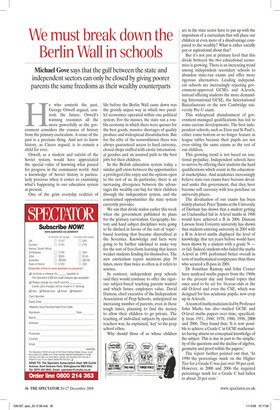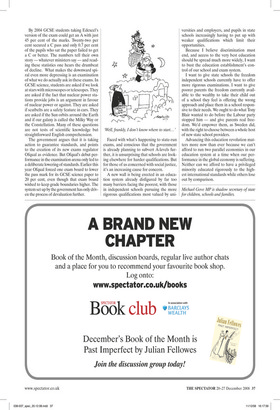We must break down the Berlin Wall in schools
Michael Gove says that the gulf between the state and independent sectors can only be closed by giving poorer parents the same freedoms as their wealthy counterparts He who controls the past, George Orwell argued, controls the future. Orwell’s warning resonates all the more powerfully as the government considers the erasure of history from the primary curriculum. A sense of the past is a precious thing. And not to know history, as Cicero argued, is to remain a child for ever.
Orwell, as a student and satirist of the Soviet system, would have appreciated the special value of knowing what passed for progress in the communist world. And a knowledge of Soviet history is particularly precious when it comes to examining what’s happening in our education system at present.
ub_pec_0qd /0/0 1 One of the grim everyday realities of
life before the Berlin Wall came down was the grossly unjust way in which two parallel economies operated within one political system. For the masses, the state ran a rouble economy in which there were queues for the best goods, massive shortages of quality produce and widespread dissatisfaction. But for the elite of the nomenklatura there was always guaranteed access to hard currency, closed shops stuffed with exotic international goodies and an assured path to the best jobs for their children.
In the British education system today a similar gulf exists between the opportunities a privileged elite enjoy and the options open to the rest of us. In particular, there is an increasing divergence between the advan tages the wealthy can buy for their children 4 through the independent system, and the constrained opportunities the state system currently provides.
We saw that divide widen earlier this week when the government published its plans for the primary curriculum. Geography, history and hard subject disciplines were going to be ditched in favour of the sort of ‘topic’based learning that became discredited in the Seventies. Knowledge and facts were going to be further sidelined to make way for the sort of free-form learning that leaves weaker students fending for themselves. The new curriculum report mentions play 39 times, more than twice as often as it refers to science.
In contrast, independent prep schools said they would continue to offer the rigorous subject-based teaching parents wanted and which future employers value. David Hanson, chief executive of the Independent Association of Prep Schools, anticipated an increasing number of parents, even in these tough times, planning to find the money to allow their children to go private. The teaching of individual subjects by specialist teachers was, he explained, ‘key’ to the prep school ethos.
Why should those of us whose children are in the state sector have to put up with the imposition of a curriculum that will place our children at even more of a disadvantage compared to the wealthy? What is either socially just or aspirational about that?
But it’s not just at primary level that this divide between the two educational economies is growing. There is an increasing trend among independent secondary schools to abandon state-run exams and offer more rigorous alternatives. Leading independent schools are increasingly rejecting government-approved GCSEs and A-levels, instead offering students the more demanding International GCSE, the International Baccalaureate or the new Cambridge university Pre-U exam.
This widespread abandonment of government-managed qualifications has led to some curious developments. The best independent schools, such as Eton and St Paul’s, either come bottom or no longer feature in league tables because their pupils are not even sitting the same exams as the rest of our children.
This growing trend is not based on irrational prejudice. Independent schools have to survive by offering their students the hard qualifications which count in the educational marketplace. And academics increasingly believe state-run exams have become devalued under this government, that they have become soft currency with less purchase on university places.
The devaluation of our exams has been widely charted. Peter Tymms at the University of Durham has shown that a student getting an Unclassified fail in A-level maths in 1988 would have achieved a B in 2006. Duncan Lawson from Coventry university has shown that students entering university in 2001 with a B in A-level maths displayed the level of knowledge that ten years before would have been shown by a student with a grade N — or fail. Indeed, students who failed the maths A-level in 1991 performed better overall in tests of mathematical competence than those who secured a B pass in 2001.
Dr Jonathan Ramsay and John Corner have analysed maths papers from the 1960s to the present day and found topics that once used to be set for 16-year-olds at the old O-level and even the CSE, which was designed for less academic pupils, now crop up in A-levels.
A team of mathematicians led by Professor John Marks has also studied GCSE and O-level maths papers over time, specifically from 1951, 1960, 1970, 1980, 1990, 2000 and 2006. They found that, ‘It is now possible to achieve a Grade C in GCSE mathematics having almost no conceptual knowledge of the subject. This is due in part to the simplicity of the questions and the decline of algebra, geometry and proof within the papers.’ The report further pointed out that, ‘In 1990 the percentage mark on the Higher Tier for a Grade C was just over 50 per cent. However, in 2000 and 2006 the required percentage mark for a Grade C had fallen to about 20 per cent.’ By 2004 GCSE students taking Edexcel’s version of the exam could get an A with just 45 per cent of the marks. Twenty-two per cent secured a C pass and only 0.7 per cent of the pupils who sat the paper failed to get a C or better. The numbers tell their own story — whatever ministers say — and reading these statistics one hears the drumbeat of decline. What makes the downward spiral even more depressing is an examination of what we do actually ask in these exams. In GCSE science, students are asked if we look at stars with microscopes or telescopes. They are asked if the fact that nuclear power stations provide jobs is an argument in favour of nuclear power or against. They are asked if seatbelts are a safety feature in cars. They are asked if the Sun orbits around the Earth and if our galaxy is called the Milky Way or the Constellation. Many of these questions are not tests of scientific knowledge but straightforward English comprehension.
The government argues that it is taking action to guarantee standards, and points to the creation of its new exams regulator Ofqual as evidence. But Ofqual’s debut performance in the examination arena only led to a deliberate lowering of standards. Earlier this year Ofqual forced one exam board to lower the pass mark for its GCSE science paper to 20 per cent, even though that exam board wished to keep grade boundaries higher. The system set up by the government has only driven the process of devaluation further. Faced with what’s happening to state-run exams, and conscious that the government is already planning to subvert A-levels further, it is unsurprising that schools are looking elsewhere for harder qualifications. But for those of us concerned with social justice, it’s an increasing cause for concern.
A new wall is being erected in an education system already disfigured by far too many barriers facing the poorest, with those in independent schools pursuing the more rigorous qualifications most valued by uni versities and employers, and pupils in state schools increasingly having to put up with weaker qualifications which limit their opportunities.
Because I believe discrimination must end, and access to the very best education should be spread much more widely, I want to bust the education establishment’s control of our school and exam system.
I want to give state schools the freedom independent schools currently have to offer more rigorous examinations. I want to give poorer parents the freedom currently available to the wealthy to take their child out of a school they feel is offering the wrong approach and place them in a school responsive to their needs. We ought to do what Tony Blair wanted to do before the Labour party stopped him — and give parents real freedom. We’d empower them, as Sweden did, with the right to choose between a whole host of new state school providers.
Advancing this education revolution matters more now than ever because we can’t afford to run two parallel economies in our education system at a time when our performance in the global economy is suffering. Neither can we afford to have a privileged minority educated rigorously to the highest international standards while others lose out by comparison.























































































































 Previous page
Previous page